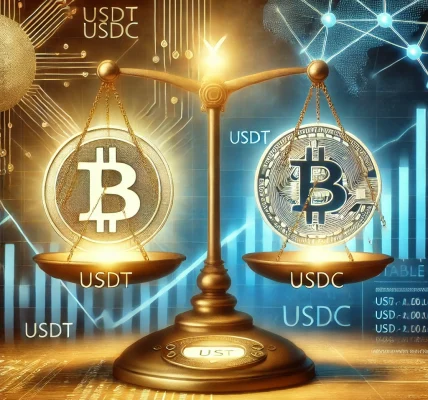Introduction
Cryptocurrency trading has gained immense popularity, and investors now have multiple platforms to choose from. Among these, centralized exchanges (CEXs) and decentralized exchanges (DEXs) are the two primary types. Both have their unique features, advantages, and risks. Choosing the right exchange depends on factors like security, control, ease of use, and liquidity.
In this guide, we will explore the key differences between centralized and decentralized exchanges, their pros and cons, and help you determine which one best suits your trading needs.
What is a Centralized Exchange (CEX)?
A centralized exchange (CEX) is a trading platform operated by a company or organization that acts as an intermediary between buyers and sellers. These exchanges function similarly to traditional stock exchanges and require users to deposit their funds into the platform before trading.
Key Features of CEXs:
- Custodial Nature: Users’ funds are held by the exchange.
- High Liquidity: Due to a large user base and trading volume.
- Regulated and Compliant: Many CEXs follow financial regulations.
- Fiat On-Ramps: Support for deposits and withdrawals using traditional currencies.
- User-Friendly Interface: Simplified trading experience for beginners.
Popular Centralized Exchanges:
- Binance – One of the largest exchanges by trading volume.
- Coinbase – Known for its ease of use and regulatory compliance.
- Kraken – Offers advanced trading features and security.
- Bybit – Popular for derivatives trading.
- KuCoin – Supports a vast number of altcoins.
Advantages of CEXs:
- Speed and Efficiency: Transactions are processed quickly.
- High Liquidity: Ensures better price stability and order execution.
- Customer Support: Users can contact support teams for assistance.
- Security Measures: Many CEXs implement strong security measures, like two-factor authentication (2FA) and insurance policies.
Disadvantages of CEXs:
- Risk of Hacking: Since funds are stored on the exchange, they are susceptible to cyberattacks.
- Lack of Control: Users do not have full control over their funds.
- Regulatory Risks: Governments may impose strict regulations on CEXs.
- KYC Requirements: Most CEXs require users to verify their identity.
What is a Decentralized Exchange (DEX)?
A decentralized exchange (DEX) operates without a central authority, allowing users to trade directly from their wallets using smart contracts. DEXs eliminate intermediaries, giving users complete control over their assets.
Key Features of DEXs:
- Non-Custodial: Users retain control of their private keys and funds.
- Peer-to-Peer Trading: Trades occur directly between users.
- Privacy-Oriented: No KYC requirements in most cases.
- Smart Contract Execution: Automated transactions through blockchain technology.
- Token Availability: Supports a wide range of cryptocurrencies, including new and emerging tokens.
Popular Decentralized Exchanges:
- Uniswap (Ethereum-based) – One of the largest DEXs.
- PancakeSwap (Binance Smart Chain) – Known for lower fees and fast transactions.
- Curve Finance – Specializes in stablecoin trading.
- SushiSwap – Offers additional features like staking.
- dYdX – Focuses on derivatives trading.
Advantages of DEXs:
- Enhanced Security: No centralized entity holds user funds, reducing hacking risks.
- Greater Privacy: No identity verification (KYC) required in most cases.
- Full Control: Users have complete ownership of their assets.
- Permissionless Access: Anyone with an internet connection can trade.
Disadvantages of DEXs:
- Lower Liquidity: Trading volumes can be lower, leading to price slippage.
- Slower Transactions: Due to blockchain confirmations.
- Complex User Experience: Not as beginner-friendly as CEXs.
- No Customer Support: Users are responsible for their own transactions and troubleshooting.
Centralized vs. Decentralized Exchanges: A Comparison
| Feature | Centralized Exchange (CEX) | Decentralized Exchange (DEX) |
|---|---|---|
| Control | Exchange holds funds | Users have full control |
| Security | Prone to hacks | More secure from external threats |
| Liquidity | High liquidity | Lower liquidity, depends on the platform |
| Speed | Faster transactions | Slower due to blockchain verification |
| Privacy | KYC required | No KYC required (mostly) |
| User Experience | Easy to use | Requires technical knowledge |
| Regulation | Subject to government laws | Less regulated, but evolving |
Which One is Right for You?
Choosing between a centralized and decentralized exchange depends on your trading goals and risk tolerance.
Choose a Centralized Exchange (CEX) if:
- You are a beginner looking for an easy-to-use platform.
- You need high liquidity and fast transactions.
- You want customer support in case of issues.
- You are comfortable complying with regulatory requirements.
Choose a Decentralized Exchange (DEX) if:
- You prioritize security and control over your funds.
- You value privacy and want to avoid KYC verification.
- You want access to a broader range of cryptocurrencies.
- You are experienced in handling blockchain transactions.
Conclusion
Both centralized and decentralized exchanges offer unique benefits and drawbacks. CEXs provide a more user-friendly and liquid environment but come with regulatory requirements and custodial risks. DEXs, on the other hand, offer enhanced security and privacy but require a higher level of technical knowledge and may have lower liquidity.
Ultimately, the right exchange for you depends on your individual needs, trading experience, and risk tolerance. Some traders even use both types of exchanges for different purposes, balancing convenience with security.
Disclaimer: This article is for informational purposes only and does not constitute financial, investment, or legal advice. Always conduct your own research before making investment decisions.




